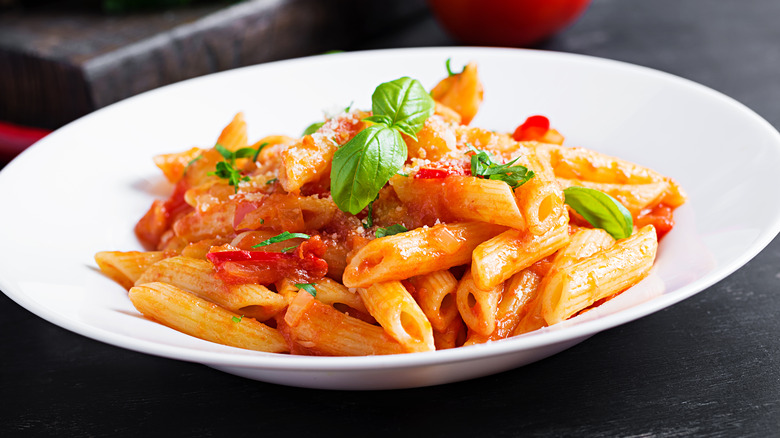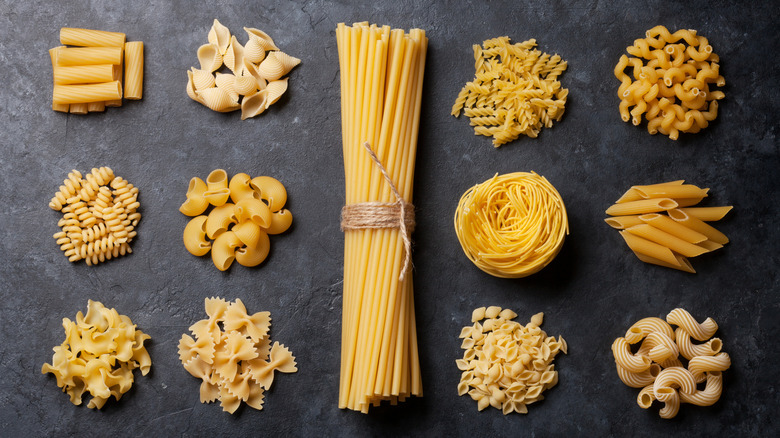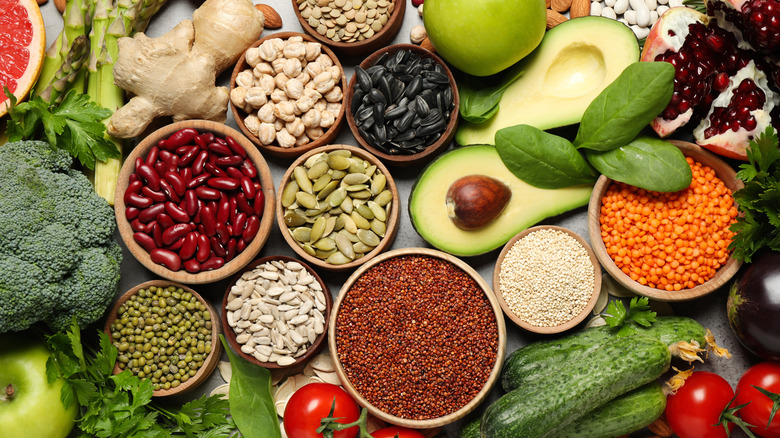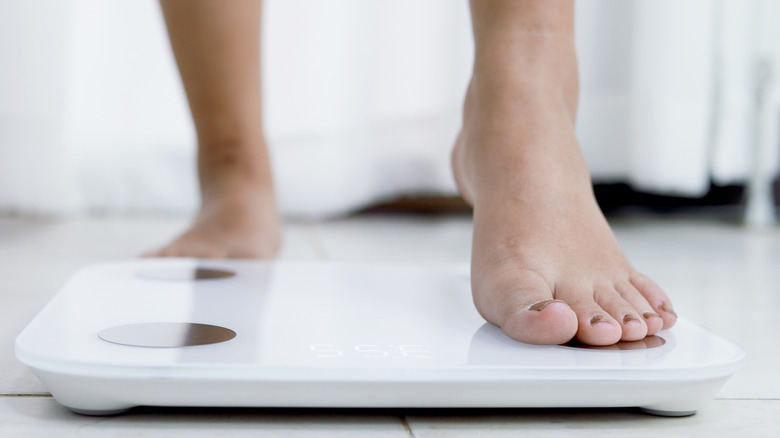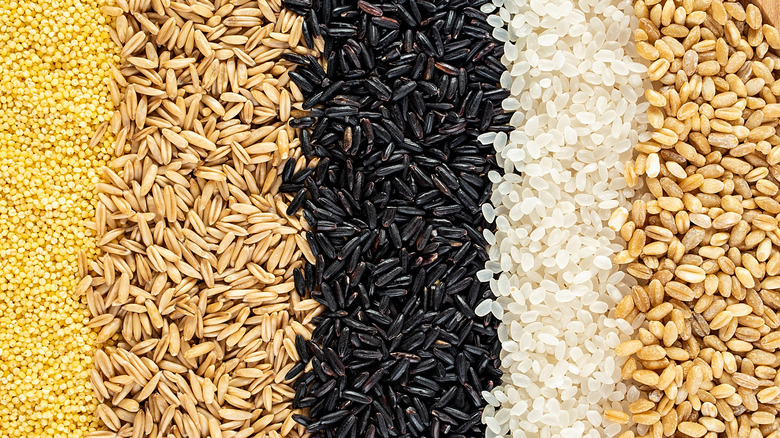What Happens To Your Body When You Eat Pasta Every Day
Italy is definitely on to something — pasta is one of those foods that some of us just feel as if we can't get enough of it. We might even be able to eat it every day. But would eating it every day be a bad thing? After all, nutrition aside, pasta is an inexpensive pantry staple that lasts for a long time. It's easy to prepare and lends itself to all kinds of dishes. Plus it's kid-friendly, so families don't have to worry about making multiple meals. Not to mention it keeps well for leftovers — you can just boil a huge pot on Sunday night, then add your toppings of choice throughout the week.
So really, the thought of having some kind of pasta daily is great! It's just a matter of whether it's healthy or not, right? The short answer is that it depends. It all comes down to what type of pasta you're eating, how you prepare it, and what you're eating for the rest of your meals. But if you're somebody who is definitely interested in the idea of having pasta every day, here's the rundown on what you should consider and how you should expect your body to react.
The nutritional profile of pasta
Before exploring the way pasta will affect your body, it's helpful to take a quick look at what pasta's made of — not only its ingredients but also its nutritive value when it breaks down in your body.
Pasta is a food made from durum wheat. This wheat flour could be either refined (usually referred to as white flour) or whole grain. Whether you're eating refined or whole-grain wheat pasta will make a difference in how nutritious it is, with whole-grain pasta being the more nutritious choice. Verywell Fit explains that a serving of pasta is usually about 2 ounces or 1 cup. However, if you're preparing to cook spaghetti noodles, it's hard to measure out 1 cup of dry spaghetti with a simple measuring cup — in this case, you can use the opening of a soda bottle and determine a 2-ounce serving based on the dry noodles that fit through the hole.
That 2-ounce serving of regular cooked pasta offers your body approximately 221 calories, which derive from 1.3 grams of fat, 43.2 grams of carbohydrates, and 8.1 grams of protein. Of those 43.2 grams of carbohydrates, you would be getting 2.5 grams of fiber. Additionally, pasta has vitamin B6 and the mineral iron.
You may have more energy
The most obvious change you'll probably notice right away is that you suddenly have more energy — seriously! Carbohydrates are your body's preferred method of fueling itself, despite the trendiness of low-carbohydrate diets. Carbohydrates are broken down in your digestive system into glucose, which enters your bloodstream, where it is then distributed to all of your cells for energy (via Cleveland Clinic).
Here's why it's important to differentiate between refined pasta and whole-grain pasta: Whole grains are a source of complex carbohydrates, which are digested differently than the simple carbohydrates in refined products. Simple carbohydrates are metabolized (that is, digested and broken down) very quickly. That means a lot of glucose enters your bloodstream all at once, so your energy levels spike, then crash shortly afterward. When you go with complex carbohydrates, such as those in whole-grain pasta, these break down much more slowly. Glucose enters your bloodstream at a more manageable rate, providing you with a steady stream of energy throughout the day.
You'll feel more full between meals
Some people might not think of pasta as an ultra-filling food — after all, it's not like something meaty or greasy. But whole-grain pasta has something even better to help you feel full: fiber. Fiber is a type of carbohydrate that your body is unable to digest. It absorbs water once it's in your digestive system, ultimately taking up a little more room in your stomach and slowing down your stomach emptying (via The Nutrition Source).
This has two major benefits: It helps you feel fuller faster and it keeps you feeling full until the next time you get to have a meal. For people who have trouble with appetite control, that means you might not feel the need to eat as much. That's why people who are trying to lose weight are encouraged to eat more fiber. That said, its effects might not be as significant as you would expect. Today's Dietitian points out that your intake of calories might only go down by 2.6%.
You could end up having blood sugar swings
If you're a fan of refined pasta and decide to eat it every day, you may have very different results than someone who eats whole-grain pasta. Most significantly, you could have blood sugar swings, confirmed The Nutrition Source, a Harvard publication. Complex carbohydrates break down slowly, whereas simple carbohydrates break down very quickly. And when all that glucose from the digested carbs goes into your bloodstream, your pancreas starts pumping out a hormone called insulin. This hormone is what signals to your cells that there's glucose for them to use for energy.
But here's the problem: When there's too much glucose at once, your body can't handle it all. This is why so many people who have a blood sugar spike tend to crash soon afterward. When this happens too often — like every day — you could be putting yourself at risk for type 2 diabetes, weight gain, and other health risks.
You'll have the needed fuel to conquer your athletic pursuits
Simple carbohydrates aren't always a bad thing, however. In some cases, you might want carbohydrates that your body can break down and use very quickly. For example, if you're looking to fuel your athletic performance. That's why carbohydrates like pasta are often encouraged as a pre-workout meal or snack, according to Verywell Fit.
Simple carbs won't stress out your digestive system the way complex carbohydrates or heavier foods like fat-dense or protein-rich foods will. Instead, your body breaks them down quickly and gives you that quick boost of glucose that all of your cells need. In fact, if you have an endurance event in which you're performing for a long period of time (such as a marathon) you'll probably need a hit of simple carbs at some point during the day. Something like a little bit of pasta, eaten completely plain without any sauce or toppings, will hit the spot.
You'll be able to build muscle
Protein gets a lot of the attention when it comes to building muscle, and rightfully so. After all, protein is the building block that your cells use when they are repairing muscle tissue damaged from an intense workout. But if your body is going to make those repairs, it needs energy — and carbohydrates are still the body's preferred source of energy. That's why carbs are an important part of building muscle, according to the Academy of Nutrition and Dietetics. It's also worth noting that after an intense workout, your body has probably depleted its reserves of carbohydrates, so you need to reload.
This is why you're supposed to eat a post-workout meal with a ratio of 3:1 carbohydrates to protein — so for every gram of protein you have, you should be having 3 grams of carbohydrates (via Healthline). A serving of pasta has about 43.2 grams of carbohydrates with 8.1 grams of protein, so its ratio is a little bit off at 5:1. However, it gives you a good starting point. Balance out that ratio with a small serving of a high-protein, low-carbohydrate food such as lean poultry or low-fat cheese.
Your overall diet quality may improve
Pasta is great, but you can't sustain yourself on just pasta by itself (we wish though, right?). Here's the thing: If you eat pasta regularly, there's a good chance the rest of your diet will be pretty decent too, at least according to some studies (via Share The Pasta).
Children and teenagers who eat pasta tend to have a higher-quality diet with more of the nutrients their bodies need, including not only fiber but also a variety of vitamins and minerals. Pasta eaters also tend to consume lower amounts of fat, particularly saturated fat. Part of the reason for this is that pasta can be topped with all kinds of healthy foods for a balanced meal. When people eat pasta, they can add vegetables, lean proteins, beans or lentils, and other nutritious choices.
It's not just kids who are eating better thanks to pasta. These same benefits that young people are reaping from regular bowls of pasta are also being enjoyed by adults (NDTV Food). If you're somebody who has been holding off on pasta because you think of it as something that's "bad" for you, consider how the nutritive value of your pasta-based meal is determined by how you're topping it. So load up on the healthy stuff!
You may be in a better mood
Ever notice how you just feel better after eating a bowl of pasta? You might think it's just because the stuff is delicious, but there's actually a scientific explanation behind it.
Pasta prompts your body to release a hormone called serotonin, registered dietitian Dana Angelo White explained in an article for the Food Network. You might have heard of serotonin referred to as the happy hormone or the feel-good hormone. That's because this chemical is what sends signals between your brain and your nervous system. It's important for mood regulation because without enough serotonin, you tend to be a little on edge. But when your body has the right amount of serotonin, you're more likely to feel calm and upbeat. You'll find it's easier to focus and even manage your emotions.
Adopting high-quality, nutritious carbohydrates like pasta into your diet will ensure that your body releases sufficient serotonin and is able to regulate your mood properly, avoiding the emotional lows you might feel when you're undernourished.
You'll lose weight
It's ironic that pasta got such a bad reputation for being a food that made people gain weight because it's actually a food that could help you lose weight, according to modern research (via USA Today). Or at least it doesn't seem to have any kind of negative outcome on weight loss efforts. The secret, based on the results of a study published in BMJ Open, seems to rely on keeping your blood sugar levels in check.
When people ate pasta as part of a low-glycemic diet (that is, a diet with slow-digesting carbohydrates instead of the fast-digesting high-glycemic ones) they still managed to lose weight. But again, this goes back to the notion of what other foods are eaten with pasta, not only at the same meal but also throughout the rest of the day. Pasta is an easy food to include in the Mediterranean diet, which is lauded by many health experts as a great way of staying lean and maintaining optimal heart health.
You'll reduce your risk of chronic disease
If you're eating a bowl of whole-grain pasta every day, you could be doing it for a long time. Yes, you could have many more days ahead of you. That's because whole grains, when eaten as part of a healthy diet, are key to a long life. The Whole Grains Council notes that whole grains have been linked with a reduced risk of many chronic diseases, including heart disease, type 2 diabetes, colorectal cancer, and stroke. So when somebody asks you about your daily serving of pasta, you can just tell them it's because you're trying to stave off disease.
According to the research, people who ate a minimum of three servings of whole grains every day saw the most benefits. So if you're having your whole-grain pasta at dinner, you could consider having oatmeal for breakfast and a slice of whole-wheat bread at lunch. However, you'll still have a reduced risk of chronic disease if you are able to eat just one serving.
You may have better control of your diet
Regardless of what type of pasta you're eating, having a little bit of it regularly (even every day) will help you have more self-control than you would have if you tried to deprive yourself. As registered dietitian Lisa Valente explained in an article for Eating Well, trying to avoid your favorite foods because you think that they're bad for you will only prompt you to overindulge on them later.
What does this mean in the case of pasta? Well, whole-grain pasta might be the more nutritionally sound option, but if refined pasta is your preference when it comes to taste, you shouldn't totally restrict yourself from having it. "Sometimes food is about more than it's nutritional value. It's convenient. It helps us celebrate with our family. It doesn't cost us an arm and a leg," Valente wrote. You can choose to have a moderate amount of refined pasta regularly. In doing so, you likely won't crave it too intensely (and potentially resent whole-grain pasta in its place).
Your digestive health will improve
You already know that the fiber in pasta is great for improving satiety, but that's not the only benefit you get from fiber in your diet. Fiber is also good for good digestive health and preventing constipation, according to the Mayo Clinic. When you have a diet that's full of this indigestible carbohydrate, it bulks up your stool, making it softer and easier to pass through your system.
Having healthy stool isn't just about being comfortable and pain-free when you sit down on the toilet. Constipation causes all kinds of problems inside your digestive system — problems that can be avoided when you have more fiber in your diet. You will be less likely to develop problems like hemorrhoids, polyps, and even colorectal cancer.
Having a whole-grain bowl of pasta — particularly if it is topped with fiber-rich vegetables and legumes — will improve your digestive health tremendously. However, refined grains can often be a cause of constipation (via WebMD). Frequently eating refined pasta with other constipating foods, such as heavy cheese, could cause more harm than good.
You'll be better protected against anemia
Among the nutrients you'll get when you're eating pasta is the mineral iron, which your body needs if it's going to carry oxygen to all of your cells, according to The Nutrtion Source. Thanks to iron, your body is able to form red blood cells to transport this oxygen through your bloodstream. If you're lacking in iron, you are at risk for a condition called anemia, which is marked primarily by a feeling of fatigue and always being cold. Other symptoms of anemia include confusion, paleness, and hair loss.
It's important to note that iron from plant sources, such as whole grains, is what's known as non-heme iron, which is not as readily used by the body as heme iron found in animal products. Therefore, people who are getting mostly plant-sourced iron will need more of it in their diet. Pasta can be an important part of getting enough iron, especially when paired with vitamin C, which helps the body absorb more iron. (Hint: The tomatoes used to make marinara sauce are a great source of vitamin C.)
You could miss out on some variety
If you're eating pasta every single day, there's a chance you're not giving yourself the opportunity to try plenty of other dietary staples out there that are available to you. Sure, pasta is great — but it's not the only base for a big bowl of goodness. There are even other great-tasting whole grains that will offer many of the same health benefits of pasta without ever letting you feel bored or limited (via Good Housekeeping).
Why not expand your diet so you can experience new tastes and textures? Rice, quinoa, bulgur, millet, and couscous are all delicious grains you can dress up with oils or sauces, sprinkle with herbs and seasonings, load up with veggies, and pair with a lean protein. And because most of them are sold dry and cooked up on the stovetop, they will last just as long as a box of dry pasta in your pantry.
Make a resolution to try a new whole grain every so often. Or, if you're feeling especially bold, you could even have a different whole grain for dinner every night of the week.

